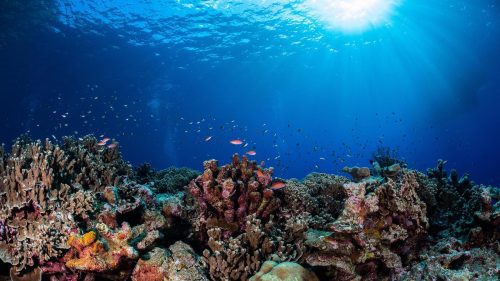Intergovernmental Oceanographic Commission of UNESCO (IOC-UNESCO)

Intergovernmental Oceanographic Commission of UNESCO (IOC-UNESCO)
Author: Esteban Gottfried Burguett, IOC-UNESCO
What is the IOC-UNESCO?
The Intergovernmental Oceanographic Commission of UNESCO (IOC-UNESCO) is the United Nations body responsible for supporting global ocean science and services. The IOC was established in 1960 as a body with functional autonomy within UNESCO, promoting international cooperation and coordinating programmes in research, services and capacity-building to learn more about the nature and resources of the ocean and coastal areas and to apply that knowledge to the improvement of management, sustainable development, the protection of the marine environment, coordination of educational programmes and the decision-making processes of its Member States.
The IOC supports all its Member States in building their scientific and institutional capacity to achieve global goals outlined in the UN Agenda 2030 and its Sustainable Development Goals, the Paris Agreement on Climate Change and the Sendai Framework on Disaster Risk Reduction.
Critical Knowledge transfer is essential to obtain societal goals and improve the management and knowledge of the ocean. Strategies and objectives are linked to long-term IOC programmes and mechanisms of collaboration such as GOOS (Global Observing System), IODE (International Oceanographic Data and Information Exchange), OBIS (Ocean Biogeographic Information System), WCRP (World Climate Research Programme), OSP (Ocean Science Programme), ICAM (Integrated Coastal Area Management) in HAB (Harmful Algal Blooms). The IOC also contributes to the European Marine Science Educators Association (EMSEA) and its Mediterranean network (EMSEA-MED).
The IOC is composed of :
General Conference: every two years with all UNESCO member states – based at UNESCO headquarters in Paris, France.
Goals:
- conservation of ecosystem and ocean status,
- development of early warning systems and disaster readiness,
- mitigation of climate change and adaptation to climate variability,
- improvement of knowledge on oceans and emerging topics in ocean science and
- education and aid to the less developed to accomplish the predefined strategic goals.
150 Member States (as of 3 July 2019) – All member states work together to protect the ocean’s health by coordinating programmes such as ocean observations, tsunami warnings and marine spatial planning.

- Assembly – The assembly meets once every two years, its main purpose is to review the work of the Commission, including the work of the Member States and the Secretariat, and formulate a joint work plan for the coming two years.
- The Executive Council – it is composed of 58 member states, which are elected by all member states, and they meet twice every year to review issues and items from ongoing work plans and make preparations for the Assemblies and decisions for General Conferences.
- Secretariat – The IOC Secretariat is located in Paris, France. The general services and central services support UNESCO sectors (such as the IOC) and include the public information sector, bureau of strategic planning (partnerships), bureau of financial management, IOS (audit), HR, deputy director-general, legal affairs, IT, management, PR-Secretariat: Together with the sectors, there are the UNESCO category 1, institutes, centres that deal with specific tasks: institute on education
The IOC is a unique global forum for the understanding and management of the ocean.
IOC High-Level Objectives (2014-2021)
- Healthy ocean ecosystems and sustained ecosystem services
- Effective early warning systems and preparedness for tsunamis and other ocean-related hazards
- Increased resilience to climate change and variability and enhanced safety, efficiency and effectiveness of ocean-based activities through scientifically-founded services, adaptation and mitigation strategies
- Enhanced knowledge of emerging ocean science issues
“What does the IOC Project Office in Venice do?”
The UNESCO Office in Venice hosts a unit of UNESCO’s Intergovernmental Oceanographic Commission – IOC. As part of its capacity-building activities, the IOC is dedicated to Ocean Literacy programs regarding marine science education and communication.
The ocean is essential to all faculties of human life, however it has not been anchored in human imagination and research to the same degree. The IOC office in Venice is on the forefront of the development and dissemination of knowledge about Ocean Literacy on a global level. The Ocean Literacy Portal is a key platform of exchange between researchers, ocean educators and policy specialists. However, the IOC involves all elements of society with its educational programs. Concretely, the project Ocean Literacy For All aims at fostering an understanding of the importance of acting for change. While the first step toward Ocean Literacy For All is communicating the ocean’s influence on us and our influence on the ocean, the second must be to deliver initiatives at the community level. The IOC, through the use of behavioural change methods and by adopting a systemic approach, aims at facilitating the creation of an ocean literate society that is ready to work towards the IOC High Level Objectives. The Ocean & Climate Village, initiated by the IOC Office in Venice, stands out in its engaging didactic community approach. For each edition the unique relations of a particular city to the ocean are uncovered in a multidisciplinary setting. Local universities, research platforms and educators come together to formulate and share a vision of Ocean Literacy.
Conclusions:
The IOC-UNESCO is a unique forum of intergovernmental cooperation. Its global outlook enables it to protect the ocean in its entirety and make accessible critical data about it. A healthy ocean is an ocean that is anchored in the consciousness of all humans, as we need to change our behaviour in order to move towards reversing negative trends in the treatment of the marine sphere. The ocean has direct effects on everyone’s life, and consequently safeguarding it is a task that concerns everyone. It is the task of IOC-UNESCO to bring relevant information about research directly to people wherever it can reach them.


